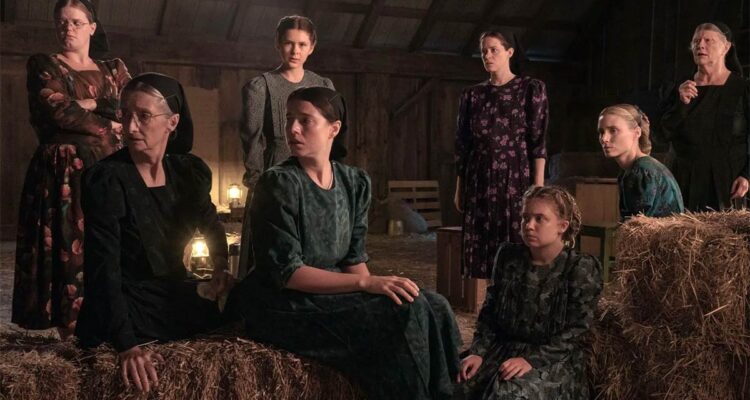TELLURIDE – The events at a secluded Mennonite colony in Bolivia during the late ‘00s spurred headlines around the world. Men from the extremely conservative religious group had raped multiple women in their community while they slept. They got away with it for years by using an anesthetic used for cows that rendered their victims helpless. When the women woke up in pain or accused any men in the community of violating them, they were framed as being “hysterical” and imagining things. After two women took matters into their own hands, setting a trap for one perpetrator, eight men ended up in custody. That horrifying tale was the inspiration for Miram Towes’ celebrated 2018 novel “Women Talking.” She described it as a “fictional response” to how the women might react if the male elders decided to forgive the rapists. In her first narrative picture in over a decade, Sarah Polley uses her considerable filmmaking talents to adapt Towes’ prose into a moving and harrowing feature.
READ MORE: “The Wonder”: Florence Pugh watches over a miracle or does she [Telluride Review]
In this timeline (don’t worry, it’s not that sort of timeline movie), the male elders travel into town to bail out the rapists leaving their women less than 24 hours to decide how to respond. The way they see the women have three options: they can do nothing, they can stay and fight, or, the most drastic choice, they pack up and leave. A vote finds the latter two options deadlocked so three sets of families (consisting of at least a grandmother, her daughter, and her granddaughter) are chosen to sit down and make a final decision for the women at large.
At first, there is a true lack of consensus. Mariche (Jessie Buckley, utterly fantastic), cannot hide her rage at the perpetrators. She wants to remain and fight back. What that entails, however, even she doesn’t know. The pregnant “spinster” Ona (Rooney Mara, glowing) is something of a sounding board for the group but seems to be in favor of leaving. Salome (Claire Foy, marvelous) not only wants to stay but enact revenge on the men in the colony, in general. Agata (Judith Ivey, soulful), the mother of both Ona and Salome, is devoutly religious and yet, still praying for a consensus she can live with. Her fellow elder, Greta (Sheila McCarthy, memorable), the mother of Mariche and Mejal (Michelle McLeod, welcome comic relief), attempts to use metaphorical stories about her horses to provide some sort of unfettered wisdom.
The third family is led by Scarface Janz (Frances McDormand, also one of the film’s producers), and her nickname and steely glare are telling. Janz is the most fundamentally religious among all the women selected and, In her opinion, they have no choice but to stay and do nothing. If they leave, she believes the male elders’ threats that the creator will deny them entry into heaven. A fate potentially worse than death itself. She quickly exits the discussion taking her offspring with her.
Over the course of a day, the women engage in different philosophical debates over potential courses of action. Unlike the real-life Mennonites, who have some connection to the outside world, the film’s colony Polley depicts is closer to a much stricter Amish community and, judging by their accents is somewhere in the fertile farming lands of North America. There is no electricity. No phones. The women do not know how to read and write and a few have never even been outside the colony’s borders. And if they are going to depart, the clock is ticking and ticking fast. The men will soon return and their reaction to the women engaging in such discussions will likely be met with physical violence.
It goes without saying that “Women Talking” thrives on the performances of its fantastically chosen ensemble. Considering the source material, that’s something of a godsend for Polley. While she gets appropriate credit for the actors’ stellar work she can’t escape the fact that much of the film takes place in the loft of a barn (unfortunately, an obvious sound stage) where, surprise, the women sit and talk. And they talk for quite a long time. A long, long time. Often, these spirit discussions are reminiscent of Fran Kranz’s “Mass” or Florian Zeller’s “The Father.” Films with so much dialogue in a confined space that they border on a filmed version of a theatrical experience. Every time “Women” feels like it’s trending in that direction Polley finds a way to open the barn door and give the proceedings a cinematic breath of fresh air. It’s dicey at times, but, thankfully, the actors are riveting enough to pull the audience through to what turns into a genuinely tense third act.
Ironically, despite the aforementioned stellar turns across the board, the standout performance in the film may actually go to the sole male actor in the cast, Ben Whishaw. As the kind and thoughtful August, he’s been tasked with taking the minutes at the women’s meeting. A position that puts his own standing in the community in danger. It’s a huge risk considering he was once excommunicated. Why he’d want to return to such an oppressive lifestyle is obvious once his longstanding love for Ona comes to light. Whishaw is no stranger at playing heartbreak and he’s absolutely soul-crushing here when it matters most.
Dense isn’t always used as a compliment when describing a movie, but in the case of “Women Talking” it’s a badge of honor. Polley is tackling numerous social dynamics among the women as well as a number of contemporary themes including women’s roles in society, religious freedom, sexual liberation, and even gender identity. The fact it turns out to be so engaging cinematically is a pleasant surprise. Even with Polley at the helm. There is talking, lots of it, but these women’s lives are at stake. They better talk it out. [B+]
“Women Talking” will hit theaters on Dec. 2.


